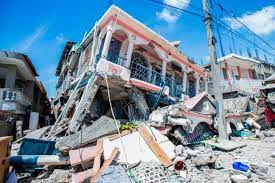The death toll in the earthquake in southern Haiti has risen to 1,297 people, the country’s civil protection authority said Sunday.
The U.S Geological Survey declared a red alert after the 7.2-magnitude quake struck Saturday morning about 12 kilometres from Saint-Louis-du-Sud.
Authorities had previously recorded 724 deaths and 2,800 injured, but the death toll was expected to climb as rescue workers continue to search for survivors.
The full extent of the destruction and damage to homes and infrastructure is not yet clear.
Rescue workers and regular citizens in Haiti are racing against an impending tropical storm to pull survivors from the rubble of buildings destroyed by the earthquake.
Interim Prime Minister Ariel Henry has declared a one-month state of emergency in response to the quake.
Search and rescue efforts by the International Red Cross have focused on the area around the particularly affected towns of Jeremie and Les Cayes, and relief supplies for at least 4,500 people were ready.
Further trouble could be on the way in the form of Tropical Storm Grace.
The U.S National Hurricane Center said the storm could hit the region on Monday, with fierce winds and heavy rain worsening the situation in the earthquake-hit area and hampering rescue efforts.
Offers of aid and condolences came pouring in from abroad.
French President Emmanuel Macron said that his country, the former colonial ruler of the Caribbean nation, “remains at the side of Haiti and its people and stands ready to support” on Twitter on Sunday.
German Chancellor Angela Merkel, UN Secretary General Antonio Gueterres and Pope Francis also expressed their condolences.
The Organisation of American States (OAS), Colombia, Argentina, Mexico, Canada and the United States have offered assistance.
Haiti, considered the poorest country in the Western Hemisphere, is still living with the impact of the January 12, 2010, magnitude-7.0 earthquake that killed some 220,000 people and left one million people homeless.
Damage from that earthquake, which struck near densely populated Port-au-Prince, was estimated at 8 billion dollars.
The U.S Geological Survey (USGS) put the epicentre of Saturday’s quake, which also triggered smaller aftershocks, on Haiti’s Tiburon peninsula, about 125 kilometres west of the capital Port-au-Prince.
The quake was also felt in the Dominican Republic, which shares the island of Hispaniola with Haiti, Dominican newspaper Diario Libre reported.
Jamaica, hundreds of kilometres away, also felt rattled.
Haiti has also been in political turmoil since the assassination of President Jovenel Moise in July.
He was shot dead in a middle-of-the-night attack at his residence by a heavily armed commando force.

